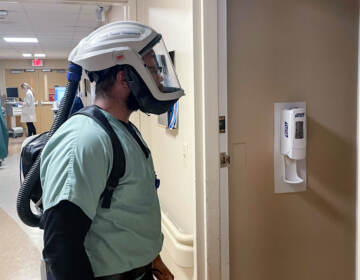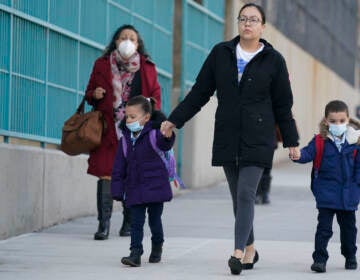Mask mandate has ‘really made a difference’ in vanquishing Delaware’s omicron surge, Carney says
The weekly average of new daily cases has plummeted by 74% since Delaware’s indoor mask mandate went into effect. Hospitalizations are down by half.

File photo: Delaware Governor, John Carney credits his mask mandate for the recent downturn in new coronavirus cases. (Jason Minto/State of Delaware)
Ask us about COVID-19: What questions do you have about the coronavirus and vaccines?
With Delaware coronavirus cases and hospitalizations plummeting after a record-setting monthlong escalation, Gov. Carney said Tuesday that his indoor mask mandate has helped vanquish the surge of the omicron variant.
The mandate that took effect Jan. 11 “really made a difference over the last couple weeks, and we’re getting better in every indicator for the spread of COVID in our community right now,’’ Carney said during his weekly coronavirus briefing.
Those indicators:
- The weekly daily average of new positive cases is 881. That’s the lowest number since Dec. 23. It’s also a drop of 74% from the peak of 3,382 a day on Jan. 12.
- The weekly positivity rate for tests is now 17.5%, almost half of the 32% recorded on Jan. 9.
- A total of 400 residents are now in the hospital, 47% below the record of 759, also on Jan. 12. Thirty-nine patients are in critical condition.

“It’s in a positive direction again. It got very negative,’’ Carney said. He said the key statistics he and health officials monitor remain “very high relative to better days under COVID-19, but certainly headed in the right direction.”
When Carney reinstituted the indoor mask mandate for stores, supermarkets, gyms, and entry into restaurants and bars, he pledged not to keep it in place “one day longer” than necessary.
But on Tuesday he gave no indication when that would be. He noted that hospitals are still over capacity with COVID and non-COVID patients and remain in “crisis” levels of care.
“Stick with us for a little while longer’’ by wearing masks “so we can get to a better place to help our hospitals,’’ he said.
Dr. Karyl Rattay, director of the state Division of Public Health, joined her boss in continuing to urge people to get fully vaccinated or, if eligible, boosted, to best protect themselves from infection, serious illness, and death.
Recent state data has shown that 9 in 10 people hospitalized for or with COVID-19 were not boosted. The ratio is the same for the people who have died.
Rattay cited a study released Tuesday by the U.S. Centers for Disease Control and Prevention which found that nationwide for adults “hospitalization rates among unvaccinated people were 23 times higher in comparison to people who had a booster.”
Among Delaware adults, 76% are fully vaccinated, and 44% have been boosted, state data show.
“So again, [there’s] lots of important reasons to be vaccinated and up to date with your vaccine, which means having a booster,’’ Rattay said.
WHYY is your source for fact-based, in-depth journalism and information. As a nonprofit organization, we rely on financial support from readers like you. Please give today.





![CoronavirusPandemic_1024x512[1]](https://whyy.org/wp-content/uploads/2020/03/CoronavirusPandemic_1024x5121-300x150.jpg)


